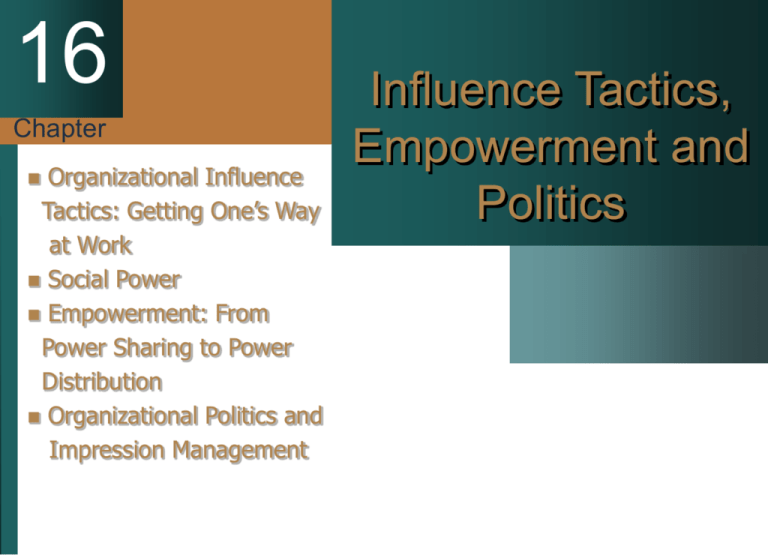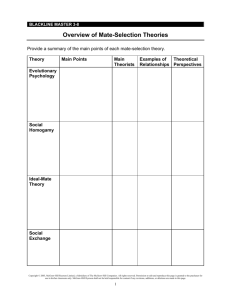
16
Chapter
Organizational Influence
Tactics: Getting One’s Way
at Work
Social Power
Empowerment: From
Power Sharing to Power
Distribution
Organizational Politics and
Impression Management
Influence Tactics,
Empowerment and
Politics
Influence
The
ability to persuade or sway
someone’s thoughts or behaviors so
that they match yours
16-3
Generic Influence Tactics
1)
2)
3)
4)
5)
6)
7)
8)
9)
McGraw-Hill
Rational persuasion - logic
Inspirational appeals emotions
Consultation - participation
Ingratiation - flattery
Personal appeals –
reference to relationship
Exchange – stated or
implied trade
Coalition tactics – support
from others
Pressure – intimidation or
threats
Legitimizing tactics –
authority or expertise
© 2004 The McGraw-Hill Companies, Inc. All rights reserved.
16-4
How to Do a Better Job of Influencing and
Persuading Others
1)
2)
Liking people tend to like those who like them
Reciprocity the belief that both good and bad deeds should be
repaid in kind—virtually universal
3)
Social proof people tend to follow the lead of those most like
themselves
4)
Consistency people tend to do what they are personally
committed to do
5)
6)
Authority people tend to defer to and respect credible experts
Scarcity people want items, information, and opportunities that
have limited availability
McGraw-Hill
© 2004 The McGraw-Hill Companies, Inc. All rights reserved.
16-5
Social Power
Social Power ability
to get things done with
human informational,
and material resources
McGraw-Hill
© 2004 The McGraw-Hill Companies, Inc. All rights reserved.
16-6
Types of Power
Socialized Power
directed at helping
others
Personalized Power
directed at helping
oneself
McGraw-Hill
© 2004 The McGraw-Hill Companies, Inc. All rights reserved.
16-7
Five Bases of Power
1)
2)
3)
4)
5)
Reward Power
Coercive Power
Legitimate Power
Expert Power
Referent Power
McGraw-Hill
© 2004 The McGraw-Hill Companies, Inc. All rights reserved.
16-8
Empowerment
Empowerment sharing
varying degrees of power
with lower-level
employees to tap their
full potential
McGraw-Hill
© 2004 The McGraw-Hill Companies, Inc. All rights reserved.
16-10
Delegation
Delegation granting
decision-making
authority to people at
lower levels
McGraw-Hill
© 2004 The McGraw-Hill Companies, Inc. All rights reserved.
16-15
Organizational Politics
Organizational
Politics intentional
enhancement of selfinterest
McGraw-Hill
© 2004 The McGraw-Hill Companies, Inc. All rights reserved.
16-16
Uncertainty Triggers Political Behavior
Sources of Uncertainty:
1) Unclear objectives
2) Vague performance
measures
3) Ill-defined decision
processes
4) Strong individual or
group competition
5) Any type of change
McGraw-Hill
© 2004 The McGraw-Hill Companies, Inc. All rights reserved.
16-17
Figure 16-5
Levels of Political Action in Organizations
Distinguishing
Characteristics
Network Level
Coalition Level
Cooperative pursuit
of general selfinterests
Cooperative pursuit
of group interests in
specific issues
Individual Level
Individual pursuit
of general selfinterests
McGraw-Hill
© 2004 The McGraw-Hill Companies, Inc. All rights reserved.
16-18
Table 16-2
Political Tactics
1)
2)
3)
4)
5)
6)
7)
8)
McGraw-Hill
Attacking or blaming others
Using information as a political
tool
Creating a favorable image
(impression management)
Developing a base of support
Praising others (ingratiation)
Forming political coalitions with
strong allies
Associating with influential
people
Creating obligations (reciprocity)
© 2004 The McGraw-Hill Companies, Inc. All rights reserved.
16-20
Impression Management
Impression
Management getting
others to see us in a
certain manner
McGraw-Hill
© 2004 The McGraw-Hill Companies, Inc. All rights reserved.






